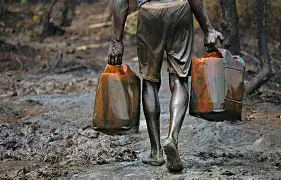Nigeria has lost over $25.7 billion to crude oil theft between 1999 and 2022, according to a new report that shocked the energy industry.
This staggering loss spans 23 years, affecting national revenue, foreign reserves, and investor confidence. In a country heavily reliant on oil exports, such persistent theft raises urgent questions about security, governance, and accountability.
As crude theft worsens, stakeholders are calling for stronger monitoring, digital surveillance, and punishment for oil criminals. Meanwhile, millions of Nigerians continue to feel the impact through lost jobs, higher inflation, and energy instability.
How Nigeria Lost $25.7 Billion in Crude
Experts from NEITI (Nigeria Extractive Industries Transparency Initiative) revealed that over 619 million barrels of oil were stolen or unaccounted for.
This volume equals a loss of over 25.7 billion dollars at current market prices. The oil was siphoned from pipelines, export terminals, and illegal refineries. Some security personnel and local elites are suspected to be involved.
The stolen oil rarely benefits the average citizen. Instead, it fuels black markets and illegal foreign trades. Authorities claim that theft levels peaked during the early 2010s and remain a threat today.
Which Regions Are Most Affected?
The Niger Delta remains the most affected region. States like Rivers, Bayelsa, and Delta suffer frequent pipeline vandalism and oil bunkering.
Environmental destruction is also widespread. Farmlands, rivers, and communities have been polluted by spills from illegal tapping. Local militias and cartels often control access to these sites, making law enforcement difficult.
Surveillance challenges and weak infrastructure also make detection hard. The government recently deployed drone technology and community pipelines monitoring teams, but results remain limited.
What Has the Government Done So Far?
The federal government has launched multiple initiatives to combat crude theft. These include the Presidential Amnesty Programme, the Pipeline Surveillance Contracts, and Nigerian Navy patrol units.
In 2022, a private security firm led by ex-militant leader Tompolo was contracted to monitor pipelines. Initial results showed a decline in theft in some zones. However, critics say enforcement remains weak and often politicized.
The Petroleum Industry Act (PIA), passed in 2021, also aims to improve transparency. Still, poor data reporting and limited prosecution of oil thieves persist.
Why This Matters to Nigerians and the Global Market
Nigeria is Africa’s biggest oil exporter. Every barrel stolen reduces national income, weakens the naira, and delays development.
Crude oil theft affects power supply, fuel pricing, and national debt. Global oil companies may also reduce investment if insecurity continues.
For the average Nigerian, this means fewer jobs, higher costs, and reduced access to basic services. Tackling oil theft could unlock billions in revenue for healthcare, education, and infrastructure.
Ultimately, crude oil theft is not just a technical problem—it’s a national emergency. Over $25.7 billion lost is a wake-up call for deeper reform.
Nigeria must invest in digital pipeline tracking, strengthen community engagement, and ensure accountability across all security agencies. The future of Nigeria’s economy depends on ending this long-standing hemorrhage.


